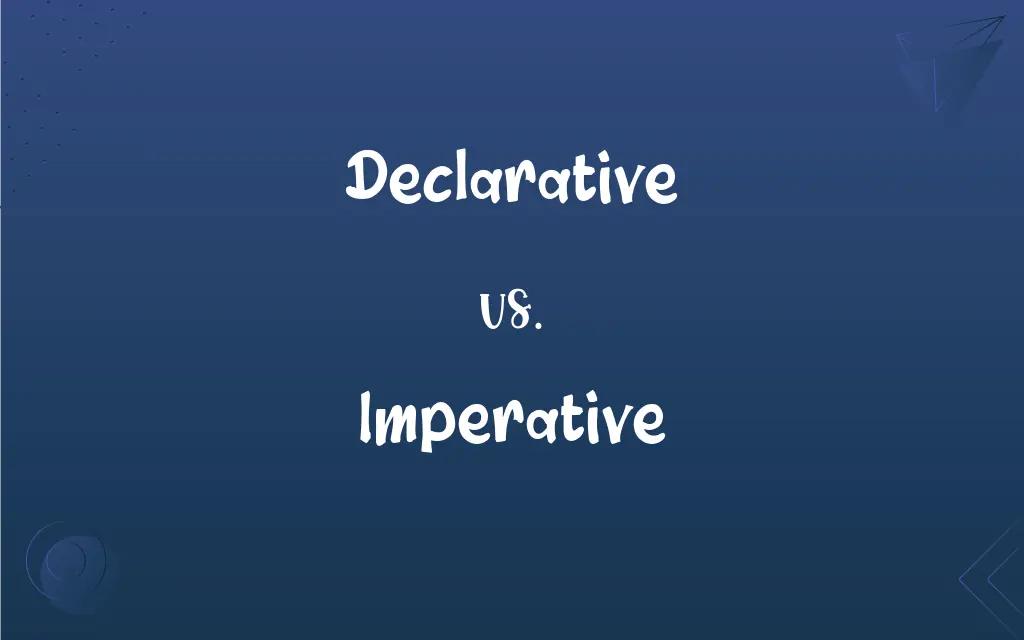Declarative vs. Imperative: What's the Difference?
Edited by Janet White || By Harlon Moss || Updated on October 12, 2023
Declarative sentences state facts or opinions, while imperative sentences give commands or make requests. They represent different grammatical moods.

Key Differences
Within the realm of linguistics, declarative and imperative sentences stand distinct in purpose and structure. Declarative sentences are utilized to convey information, make statements, or express opinions, thereby providing details or sharing knowledge. In contrast, imperative sentences are utilized to issue commands, make requests, or give instructions, thereby seeking compliance or action from the reader or listener.
Delving deeper, declarative sentences are often structured in a straightforward subject-verb-object manner. They express assertions, describe states of being, and can relay truths or opinions. Contrariwise, imperative sentences typically omit the subject and focus on the verb to swiftly deliver a directive or order. The contrast in their structural build serves their respective communicative objectives: sharing information versus inciting action.
When it comes to the tone and intention, declarative sentences commonly adopt a neutral, informative, or expressive tone, as they aim to share something with the audience. Imperative sentences, on the other hand, inherently contain a directive or commanding tone, as they aim to instruct or guide the actions of the audience. Both declarative and imperative moods serve diverse communicative needs, establishing facts or directing behavior respectively.
Examining usage context, declarative sentences are pervasive, used in descriptive writing, storytelling, reporting, and anywhere information is to be conveyed. In comparison, imperative sentences are prominently used in instructional writing, commands, recipes, and directions, whereby explicit guidance or direction is required. Both declarative and imperative sentences, hence, find varied applications based on their intrinsic communicative roles.
Engaging in dialogues or written communication, declarative sentences build the foundational content, offering context, facts, or explanatory details. Alternatively, imperative sentences facilitate action or response, enabling a progression or shift in activities or discussions. The dynamic between declarative and imperative sentences essentially balances the informational and actionable dimensions of language communication.
ADVERTISEMENT
Comparison Chart
Purpose
To convey information or express opinions.
To issue commands, instructions, or make requests.
Typical Structure
Subject-Verb-Object (SVO).
Often omits subject, focuses on verb.
Tone
Neutral, informative, or expressive.
Commanding or directive.
Application Context
Descriptive writing, storytelling, reporting.
Instructions, recipes, directions.
Interaction in Dialogue
Provides context, facts, or details.
Facilitates action, progression, or response.
ADVERTISEMENT
Declarative and Imperative Definitions
Declarative
Declarative sentences that state verifiable facts.
Water boils at 100 degrees Celsius.
Imperative
Imperative sentences that convey a polite request.
Please pass the salt.
Declarative
Declarative sentences that convey emotions or opinions.
That movie was absolutely fantastic!
Imperative
Imperative sentences used in providing directions or instructions.
Stir the mixture gently.
Declarative
Declarative sentences that provide specific information.
The sun rises in the east.
Imperative
Imperative sentences that instruct or demand action.
Close the door!
Declarative
Declarative sentences that are structured as a question but deliver a statement.
Isn’t it a lovely day today?
Imperative
Imperative sentences that seek a response in a directive manner.
Tell me your name.
Declarative
Declarative sentences that convey a negative statement.
I do not like pineapples on pizza.
Imperative
Imperative sentences that give a stern warning or forbid.
Do not touch the wet paint.
Declarative
Serving to declare or state.
Imperative
Necessary or urgent
"It is imperative that we continue to move with speed to make housing more affordable" (Timothy Geithner).
Declarative
Of, relating to, or being an element or construction used to make a statement
A declarative sentence.
Imperative
Expressing a command or plea; peremptory
Requests that grew more and more imperative.
FAQs
Can declarative sentences express both facts and opinions?
Yes, they can express either facts, opinions, or both.
How is imperative used in language?
It is used to give commands, make requests, or provide instructions.
Are imperative sentences often short and concise?
Yes, they tend to be succinct to deliver clear commands or requests.
Do declarative sentences always state the truth?
No, they can convey false information or subjective opinions as well.
What is the primary purpose of declarative sentences?
To provide information or express opinions.
Which sentence type typically uses an exclamation mark?
Imperative sentences often use exclamation marks to convey urgency.
Can declarative sentences express emotions?
Yes, they can express emotions when stating opinions or experiences.
Can imperative sentences convey polite requests?
Yes, they can be framed politely using words like "please."
Can imperative sentences be used to give warnings?
Yes, they can be utilized to issue warnings or prohibitions.
Do declarative sentences primarily use the indicative mood?
Yes, they utilize the indicative mood to state or describe.
In which writing styles are declarative sentences prevalent?
They are prevalent in descriptive, narrative, and informational writing.
How do declarative and imperative sentences interact in dialogues?
Declarative sentences provide information, while imperatives guide actions or responses.
Can imperative sentences omit the subject?
Yes, the subject (often "you") is usually implied and omitted.
How does the tone of imperative sentences usually appear?
It often appears commanding, instructive, or requesting.
Are imperative sentences common in instructional writing?
Yes, they frequently appear in manuals, recipes, and directives.
Are declarative sentences limited to positive statements?
No, they can make both positive and negative statements.
Is the use of periods common in declarative sentences?
Yes, periods are typically used to end declarative sentences.
Can declarative sentences be used to ask questions?
Typically, no. Interrogative sentences are used for questions.
Can imperative sentences express a sense of urgency?
Yes, through word choice and punctuation, urgency can be conveyed.
Can imperative sentences be utilized in informal contexts?
Yes, they are widely used in both formal and informal contexts.
About Author
Written by
Harlon MossHarlon is a seasoned quality moderator and accomplished content writer for Difference Wiki. An alumnus of the prestigious University of California, he earned his degree in Computer Science. Leveraging his academic background, Harlon brings a meticulous and informed perspective to his work, ensuring content accuracy and excellence.
Edited by
Janet WhiteJanet White has been an esteemed writer and blogger for Difference Wiki. Holding a Master's degree in Science and Medical Journalism from the prestigious Boston University, she has consistently demonstrated her expertise and passion for her field. When she's not immersed in her work, Janet relishes her time exercising, delving into a good book, and cherishing moments with friends and family.































































